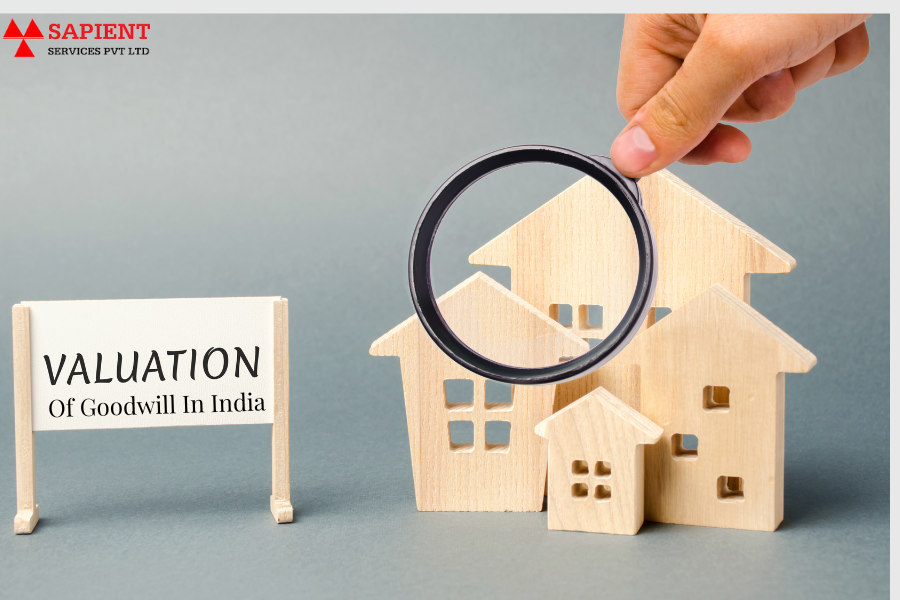Goodwill is an intangible asset that represents the value of a company’s brand reputation, customer relationships, and other non-physical assets that contribute to its profitability. In India, accurately valuing goodwill is crucial for various financial and strategic decisions, including mergers, acquisitions, and financial reporting. This article goes further into the definition of goodwill, its importance, and its relevance in today’s business landscape. We will also explore the specific methods and tools employed by Sapient Services to evaluate the valuation of goodwill in India, the influence of Indian accounting standards on the valuation process, common challenges businesses face, and the consequences of neglecting proper valuation.
Understanding Goodwill
Goodwill arises when a company acquires another business for a price exceeding the fair value of its identifiable net assets. This excess amount reflects intangible elements such as brand reputation, customer loyalty, and intellectual property. According to the Indian Accounting Standard (Ind AS) 103, goodwill is recognized as an asset when an acquirer gains control of a business and is calculated as the excess of the purchase consideration over the fair value of the identifiable net assets acquired.
The Importance of Valuation of Goodwill in India
Valuation of Goodwill in India is essential for several reasons:
- Mergers and Acquisitions (M&A): In M&A transactions, understanding the value of goodwill helps in determining the purchase price and assessing the future economic benefits expected from the acquisition.
- Financial Reporting: Accurate valuation of goodwill helps guarantee compliance with accounting standards, providing stakeholders with a true and fair view of the company’s financial position.
- Taxation: Goodwill valuation is crucial for accurate wealth tax assessments and ensures fair contributions to public services.
- Strategic Decision-Making: Recognizing the significance of goodwill value is essential for making informed strategic choices, including restructuring, securing funds, or selling business segments for optimal outcomes.
Sapient Services’ Approach to Goodwill Valuation in India
Sapient Services puts forward a complete approach to goodwill valuation, combining industry expertise with established valuation methodologies. The firm provides valuation reports that offer an overview of the company, industry, and economy; discuss value drivers; outline the analysis performed, along with the inputs and assumptions; and incorporate detailed exhibits that support the valuation conclusion.
The valuation of goodwill is often based on the customs of the trade and is generally calculated as a multiple of average profits or super-profits.
Influence of Indian Accounting Standards on Goodwill Valuation
Indian Accounting Standards (Ind AS) provide specific guidelines for the recognition and measurement of goodwill:
- Ind AS 103 – Business Combinations: This standard outlines the accounting treatment for business combinations, including the recognition of goodwill as the excess of the purchase consideration over the fair value of identifiable net assets.
- Ind AS 36 – Impairment of Assets: Ind AS 36 prescribes the procedures for impairment testing. Goodwill is tested for impairment at the level of the cash-generating unit (CGU) to which it belongs. A CGU is the smallest identifiable group of assets that generates cash inflows largely independent of other assets or groups of assets.
These standards will guarantee that goodwill is accurately represented in financial statements and that any impairment is promptly recognized.
Common Challenges in Valuing Goodwill in India
Businesses in India often encounter several challenges when valuing goodwill:
- Subjectivity: Goodwill valuation involves subjective judgments, which can make it difficult to determine an exact value. This subjectivity stems from the intangible nature of goodwill, as it is not easily quantifiable through objective measures.
- Market Volatility: Market volatility plays a significant role in the valuation of intangible assets, including goodwill. The unpredictable fluctuations in the market can lead to varying goodwill valuations, reflecting the dynamic nature of the business environment.
- Regulatory Compliance: Adhering to continuously changing accounting standards and regulations is crucial for maintaining regulatory compliance in goodwill valuation. Continuous monitoring and adaptation are necessary to ensure that the valuation methods align with current financial reporting requirements.
- Data Limitations: The limited availability of reliable data poses a challenge in accurately assessing the factors contributing to goodwill. Without sufficient information, it becomes challenging to make informed judgments about the value of intangible assets, potentially leading to inaccurate valuations.
The Consequences of Neglecting Goodwill Valuation
Neglecting proper goodwill valuation can have significant repercussions:
- Financial Misrepresentation: Overstated or understated goodwill can mislead stakeholders about the company’s true financial health, jeopardizing trust and credibility.
- Regulatory Penalties: Non-compliance with accounting standards related to goodwill can result in severe legal repercussions and hefty financial penalties, tarnishing the company’s reputation.
- Strategic Missteps: Inaccurate goodwill valuation can lead to detrimental strategic decisions with long-lasting consequences, such as overpaying in acquisitions or inefficiently allocating resources, hindering the company’s growth and success.
Conclusion
In the contemporary Indian business environment, the need for valuation of goodwill in India is of utmost importance. It plays a critical role in financial reporting, taxation, and strategic decision-making. Sapient Services builds on its expertise to provide accurate and reliable goodwill valuations, which guarantees compliance with Indian accounting standards and aiding businesses in making informed decisions. Neglecting proper valuation of goodwill in India can lead to financial misrepresentation, regulatory penalties, and strategic errors, underscoring the necessity for meticulous goodwill assessment.

